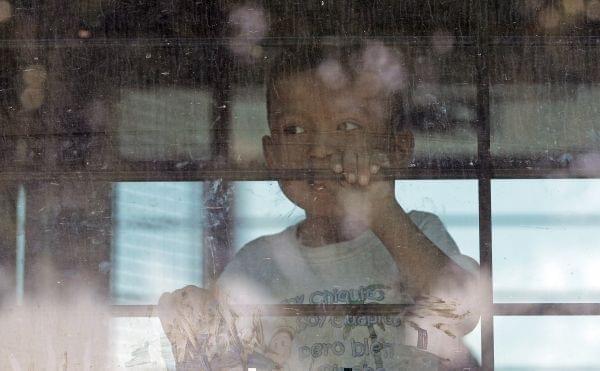Immigrant Children In IL Detention Centers; Self-Driving Cars; Don’t Bring Your Phone Into The Woods

David J. Phillip/AP
On the 21st: The living conditions for immigrant children in Chicago detention centers. Plus, self-driving cars might be the future of transportation sooner than you'd think -- but, are people in Illinois comfortable with this? And, in a world of never ending buzzing and alerts, new research suggests that in order to get the full benefits of nature, consider leaving your devices at home.
There are at least 2,551 immigrant children in the United States who were separated from their parents because of the Trump Administration’s zero-tolerance border policy. Now that a federal judge has ordered the reunification of these families, the Trump administration has until Wednesday to turn over a list of all parents who are quote - “ineligible” for reunification.
Here in Illinois, more than 100 immigrant children and teens separated from their parents at the border have been held in Chicago-area shelters this year. By last week, all but 17 of those kids here in Illinois had been reunited with their parents.
But - this spotlight on family separation has drawn attention to the living conditions for children occupying these shelters. Senator Dick Durbin has called for an investigation into one Illinois facility after allegations of abuse there first reported by the Washington Post a few weeks ago. The U.S. Health and Human Services and Illinois’s Department of Children and Family Services are investigating.
ProPublica Illinois has been looking into we know — and don’t about these — 11 Chicago-area children’s shelters.
On the line with us to talk more about their reporting were ProPublica Illinois reporters Jodi Cohen and Duaa Eldeib.
More than 100 separated immigrant children have been held in Chicago-area shelters this year. There have been allegations of abuse & negligence, & many are calling for investigation including @DickDurbin
— The 21st (@21stShow) July 31, 2018
more now w/ @ProPublicaIL@deldeib @Jodiscohen
Plus—
Right now, you might be listening to this show while driving. Well — imagine that the car is driving itself.
That future might not be too far off. Tech corporations like Uber and Google have made it no secret that self-driving cars are a big priority for them. That shift could change local economies as well - here in Illinois, two companies founded just in the last ten years make products that relate to self-driving cars.
What do you think? Would you use a self-driving car in your day to day life? OR would you feel comfortable sharing the road with one?
Joining us on the line was Wolfgang Juchmann, he’s Vice President of Worldwide Sales and Business Development with Autonomous Stuff, a company based in Morton. Here with me in studio is Geir Dullerud, professor of mechanical science and engineering at the University of Illinois.
But first, we wanted to check in with Ryan Denham with our partner station WGLT in Bloomington-Normal. He’s been reporting on one of the automated vehicle companies that’s recently set up a factory in Normal - and that’s a company called Rivian.
The Morton IL company @AutonomouStuff provides components for autonomous products like vehicles.
— The 21st (@21stShow) July 31, 2018
"If you ask me when autonomous driving is happening, it's happening right now"
- VP Wolfgang Juchmann
And—
It’s becoming increasingly hard to unplug. You’ve got cell phones and tablets, social media and games, and yes, of course, the news. So today we’re going to talk about taking a break from all of that by stepping outside and get some fresh air.
It seems logical that if you really want to take a break you should leave your devices behind. But now we’ve got some scientific research that backs up that idea.
Illinois landscape architect William Sullivan was one of the people behind that research. He’s the head of the Department of Landscape Architecture at the U of I, and he was with us at WILL. Also joining us from the Morton Arboretum in Lisle was Brenda Spitzer, who’s a forest therapy guide.
Professor William Sullivan, the head of @LA_at_ILLINOIS
— The 21st (@21stShow) July 31, 2018
at @Illinois_Alma recently studied the effects of devices in nature.
He found that the only space in which people could improve their mental fatigue was a natural one without technology. https://t.co/ieRXDeijgV
